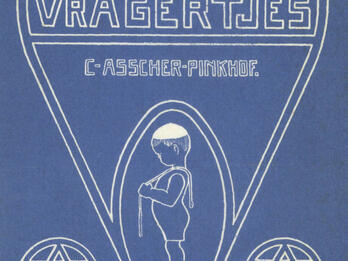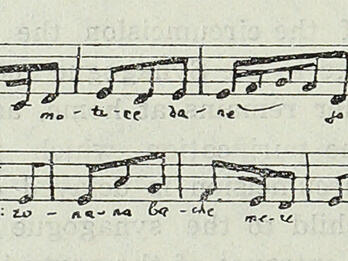Sermon: On David and Jeroboam
To understand this parable [of David and Jeroboam in b. Sanhedrin 102], we must say that Rabba bar bar Ḥana also describes people of two different kinds, whose deeds and way of life are different from one another [b. Nazir 23]. Truly, if we try to take a critical look at the actions of people, we will find that there can be two people who, even though they seem at first glance to be similar in nature, stance, and spirit, they are indeed as far apart as east from west. And I remember that in my town [in Eastern Europe] there were two men who in external appearance were similar to each other in all particulars: both were rich and important householders, both were honest and gave generously to charitable causes, and both were well versed in Torah and general education. Nevertheless, the one was beloved, endeared, and honored by all, and the second was the opposite. When I delved into the reason, I found that the first performed all his good deeds just for the sake of the mitzvah. All his generous giving was for the sole purpose of supporting the poor and standing by the needy. He avoided honors and despised praise and acclamation. By contrast, the second did everything only for his own glory or because of his tender disposition, and all his charitable giving was undertaken so that people would sing his praises in the public square.
If we take a look at the nature and character of our people, we will meet at every turn people whose different deeds and contradictory manners will confirm the paradigm established by these two men. Sometimes we will find a person who is a Jew of the simplest kind. All his behaviors and those of his family, though they conform entirely to the spirit of modern times and the rules of society, do not deviate even a single step from norms of morality and Judaism. He may live in a spacious house, but from a look at its walls you can tell that good Jews live in it. His attire is modern and fashionable, but his tzitzit are not absent from it either. He raises his sons with a modern education, but he takes extra precaution that their education will not lead them astray, and that they will always be observant and faithful sons and daughters to their religion and people. In short, he tries with might and main to find the just compromise and middle path between modern life and religion, and sees to it that the one should not trespass on the domain of the other. Such a person is beloved of God and of humankind.
By contrast, you will find another Jew who also tries to lead a well-mannered life and to mingle with society. But how fickle and strange is his life. He tries with all his energy to imitate the manner of the gentile, as a monkey imitates humans. All the gentile ways are fine and beautiful, and all the Jewish ways are detested and despicable to him. He strains with every effort to carry out the customs of the non-Jewish world in all their particulars and fine details, but keeps at arm’s length anything that has a smidgen or whiff of Jewishness about it, for fear that someone will recognize that he is Jewish. His house is that of a gentile; he dresses like a non-Jew; he raises his children to a vacuous and confused existence, with neither Torah nor civility. Even though his habits and actions are according to law and social mores, they are remote from the ways of morality and Judaism. [ . . . ]
Who of us has not seen or felt the clear joy that prevailed in our ancestors’ homes during the Sabbaths and Festivals? The warm, strong love that held sway in their homes, from the fathers to the sons and from the sons to the fathers, and from the sons and daughters to one another—all of our brethren born in Europe know this without a doubt, and have also felt this on their own.
But what do we see in the life of these generations of ours here? What is their lot in life? Nothingness and emptiness. Wherever we look, we find only people all worn out and sapped of strength, heads aching and sick at heart. Our world is full of suffering and troubles that force themselves on us on account of the cares of making a living. There is neither rest nor quiet, neither joy nor pleasure. During the day we labor to earn our bread, and at night there is no rest for our souls, from worrying about our sons who have strayed from us and are ashamed of their fathers, and other such things that shorten our lives. [ . . . ]
The deterioration of Jewishness in America is a result of the change in education to which we have become accustomed here. Since our ancestors in Europe made it obligatory to implant in their sons’ hearts Torah—which is the beginning of wisdom—and the fear of God when they were still young, they only afterwards taught them a trade and general education. For that reason, their sons grew up as a blessing for the world; they conducted themselves in an upright manner, sanctified the name of God, and showed signs of honor and love to their people all the days of their lives. But here [in America] we bow down to the Golden Calf. Here the first thing we take care of is securing for our children good and productive trades. We prioritize general education over religious education. The English school takes precedence, and we happily sacrifice to it the choice years of our sons. And the Torah! What is its place in the world? It will rest desolate and miserable. And neither do we sense or feel how it is forgotten and forsaken, nor do we pay attention to its fate. Therefore, this trouble comes upon us—our sons leave us in our prime and abhor us when our strength fails us, and this is the recompense that they extend to us for our travails and endeavors on their account.
Credits
Published in: The Posen Library of Jewish Culture and Civilization, vol. 7.




